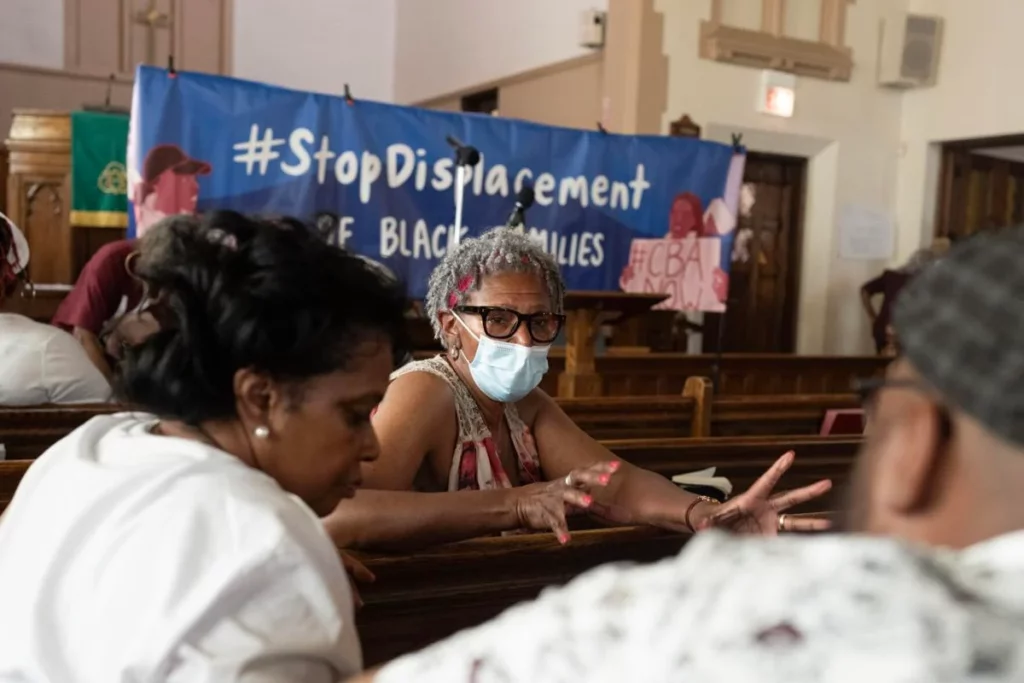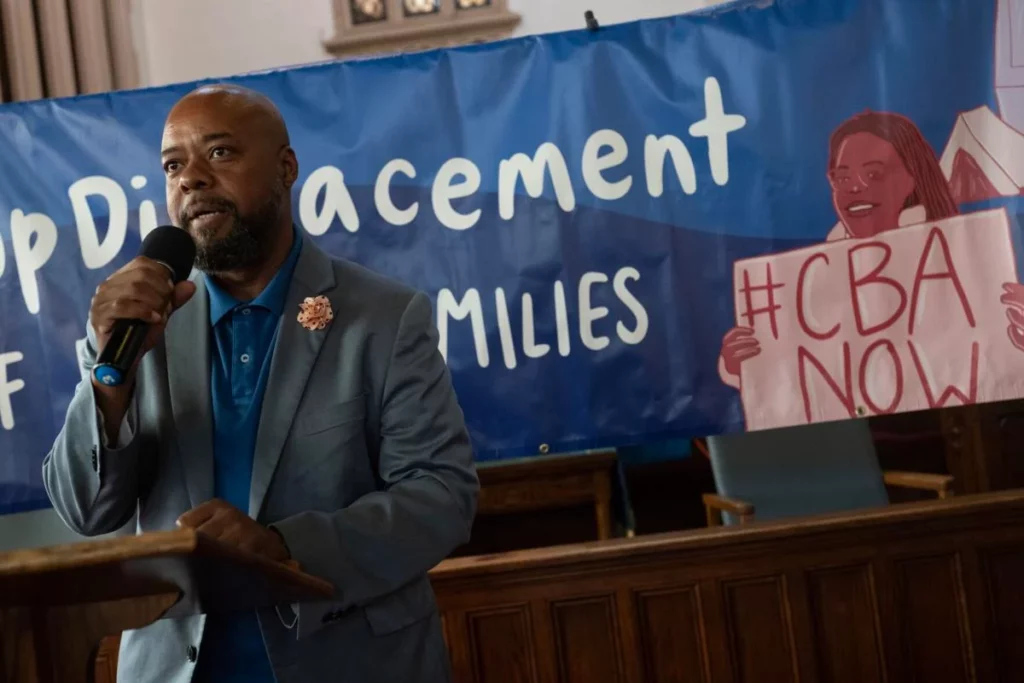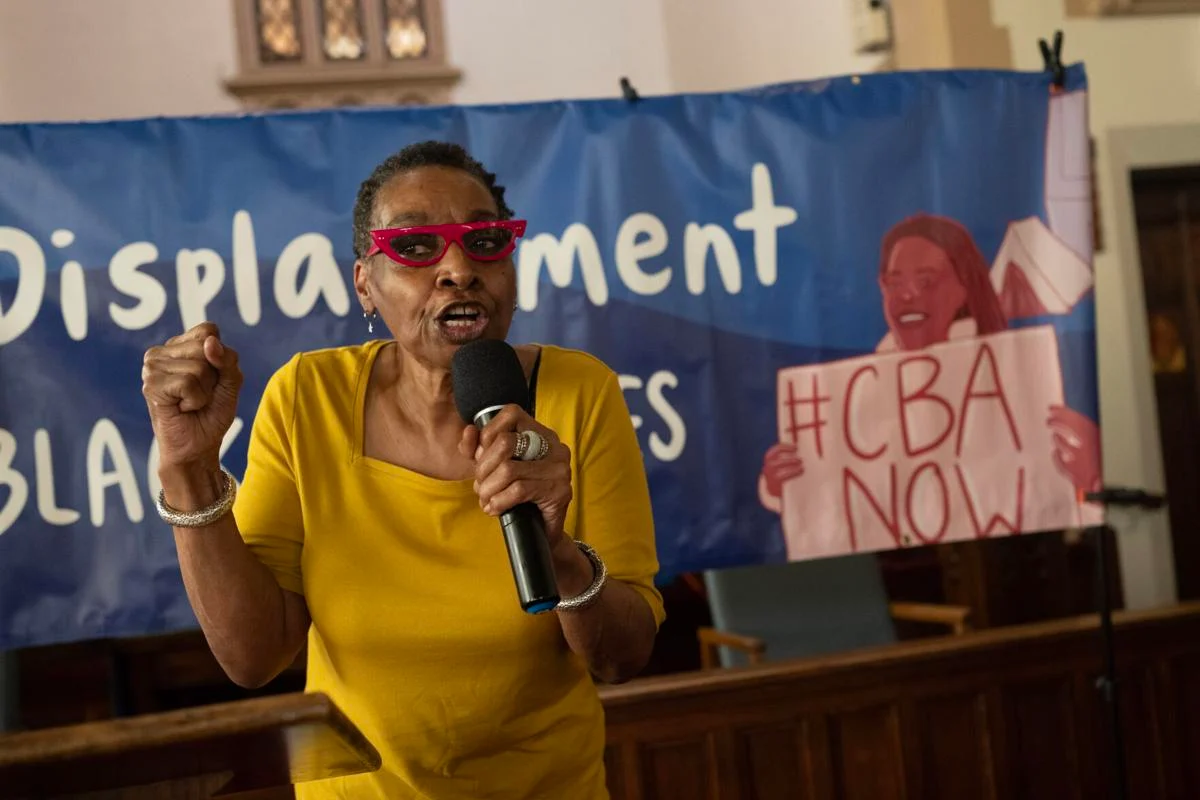After years of organizing by Woodlawn community members and activists, Chicago City Council passed an ordinance to help prevent displacement of renters and homeowners in the neighborhood. Now, activists are demanding the same housing protections for South Shore residents.
At a Saturday, June 24, Community Benefits Agreement (CBA) Summit, more than one hundred neighbors and organizers gathered at the South Shore United Methodist’s Unity Church to discuss the community’s experiences with displacement and needs as they draft a South Shore CBA ordinance. Led by the Coalition for a CBA, organizers made space for renters, property owners and those displaced from South Shore by rising rent and property costs to talk about their experiences and what protections residents need to stay in the neighborhood.
Throughout the day, speakers from Not Me We (NMW), Kenwood-Oakland Community Organization (KOCO) and Southside Together Organizing for Power (STOP) led conversations on expanding tenant protections, preserving affordable housing, and ensuring equitable development in South Shore.
“How can we acknowledge that this neighborhood is shifting in so many ways that instead of displacing people, help to elevate our neighborhoods together, collectively?” said Not Me We organizer Trina Reynolds-Tyler. “Because once you’re displaced, there’s no way to come back, and we don’t want to lose people. We lose our most vulnerable populations on a regular basis.”
First announced in 2015, the Obama Presidential Center (OPC) site in Jackson Park has drawn criticism from activists and neighbors alike, who have argued that longtime residents will be priced out of the surrounding neighborhoods without affordable housing protections in place. Construction on the OPC broke ground in 2021 and is expected to finish in 2025—but for many South Shore residents, the signs of displacement have long since arrived.
In 2019, an investigative study by the University of Illinois’ Voorhees Center found evidence of rising rents and property values in the two-mile radius around the Jackson Park site. This area is primarily made up of renters, of which forty-two percent of tenants have incomes below $20,000. That same year, the Lawyers’ Committee for Better Housing found that South Shore had the highest eviction filing rate of any community area in Chicago—about three times higher than the city as a whole.
Beyond new developments like the OPC, systemic issues with South Shore’s housing stock are also putting tenants and homeowners at risk. Organizers and residents raised issues with negligent landlords, unsafe housing conditions, and a lack of tenant protections from the city.
“People across South Shore deserve to have protections in place and can make these fights easier and make it so that they don’t have to fend off landlords or their home that way,” said Sivi Miles, representing the Catalyst Tenants Union. This past winter, Miles was one of fifteen tenants of a Catalyst Realty building in South Shore who were displaced after the building’s heat and water failed.
South Shore has also seen the largest share of homes for sale bought by investors than any other neighborhood in the city. According to the Illinois Answers Project, investors bought up thirty-two percent of homes for sale in the third quarter of 2022—almost twice as many as investors bought the year the OPC site was announced.

Kiara Hardin, a former South Shore tenant, was forced to move to Washington Park when it came time to buy a home. “If this system of working hard to be a homeowner and choosing the environments in which I wanted to live didn’t work for me, who is it working for?” she said.
Linda Jennings, a current property owner, drew attention to South Shore’s population of older adults—many of whom she described as owning their own property but could not afford rising property taxes or building maintenance costs. “We’re living with this threat of displacement. Regardless if some of us have paid off our homes … we still live in a certain type of precariousness, afraid it’s going to happen to us,” Jennings said.
In 2020, 20th Ward Alderwoman Jeanette Taylor sponsored the Woodlawn Housing Preservation Ordinance, along with former 5th Ward Alderwoman Leslie Hairston and Mayor Lori Lightfoot. After months of legislative debates, the ordinance unanimously passed City Council; it set aside $4.5 million for affordable housing programs in Woodlawn. While the proposal originally included protections for residents within a two-mile radius of the Obama Center, including Hyde Park, South Shore and Woodlawn, Hyde Park and South Shore were ultimately negotiated out.
For Taylor, Woodlawn’s ordinance is a step in the right direction, but the movement to protect low-income residents hasn’t gone far enough.
“Passing the Woodlawn Housing Ordinance has not stopped displacement. It has slowed it down, but it has not stopped. In my last four years (in) office, just in Woodlawn, we lost a thousand residents. And those are people who are not coming back,” Taylor said. “We got some work to do when it comes to making sure that we’re protecting the people who live in these spaces but also helping out homeowners.”
The pending South Shore ordinance would include more expansive protections to guard against displacement and preserve affordable housing near the OPC. To expand tenant protections, CBA Coalition organizers have also demanded that the city create an office to advocate for tenant rights and a publicly available rental registry to hold negligent landlords accountable, as well as setting aside $15 million in immediate rental relief.
For South Shore homeowners, the CBA Coalition calls on City Council to offer grants and down-payment assistance, forgive tax debts owed by low-income residents, and allocate $20 million toward grants and low-interest loans to homeowner associations for badly needed repairs. Organizers also urge the city to set aside all city-owned vacant lots in South Shore and those at 63rd Street and Blackstone Avenue for affordable housing developments. This would reserve seventy-five percent of the units for households making no more than thirty percent of the Area Median Income, which in 2020 was $35,887 in South Shore and $27,541 in Woodlawn, according to city data.
The CBA Coalition also advocates for a guaranteed right to return for current and longtime South Shore residents, to prioritize loans, grants, and subsidized units to those pushed out by rising housing costs and evictions. “We don’t want to live in a neighborhood where we see the same faces less and less. We don’t want to push folks out of what they consider their home base,” said Reynolds-Tyler.
At the CBA Summit, Taylor and new 5th Ward Ald. Desmon Yancy reaffirmed their commitments to a South Shore CBA ordinance. Taylor has been a longtime supporter of affordable housing and equitable development programs and talked about the need to expand beyond the communities immediately near the OPC.
“We need to explore CBA citywide. We just do. Because it’s South Shore today, it’ll be Washington Park tomorrow. It’ll be Austin another time. It will be Lawndale,” Taylor said. “(Developers) have decided that they want our city, but they don’t want us and that just ain’t good enough.”
A non-binding advisory referendum saw nearly ninety percent of 5th Ward residents vote in support of a South Shore CBA ordinance in the February 28 municipal election. Yancy, whose ward includes South Shore, also confirmed that he was committed to backing the issue as a member of City Council, saying, “It’s time for the city of Chicago to support its residents and provide support for owners and renters so that we can enjoy the fruits of all our labor.”
“I moved to South Shore thirty years ago, for the same reason I moved to South Shore five years ago. It’s because it’s such a vibrant, beautiful historic community that is historically Black and needs to stay that,” Yancy added. “I’m going to work my tail off to make sure that we get, not just the twenty-six votes that we need to pass this ordinance, that we get the full support of the City Council and this Mayor. Because if we don’t save South Shore…they’re coming for the rest of us.”

South Shore’s community benefits ordinance has not yet been introduced to City Council. A list of demands can be found at obamacba.org, and the organizers intend to make the full text of the ordinance publicly available in the near future.
“We bring the crisis to its creators and take action to force our demands to be met. It can feel inevitable that we have to live at the whims of our landlords,” said Chinella Miller, an education organizer with KOCO. “It can feel inevitable that developers get richer, and we get priced out. It can feel inevitable that homelessness continues to get worse. But organizing is about changing the conditions of what is possible.”
Reema Saleh is a journalist and digital media producer. She last wrote about José Olivarez’ Promises of Gold.


